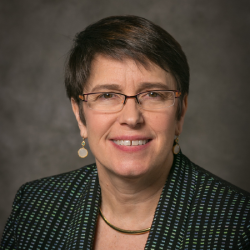2020 Year in Review: Executive Director Catherine O’Riordan
 We faced many challenges in 2020, from the arrival of COVID-19 to the social unrest due to racial injustice to the very troubling events around the U.S. presidential election. Throughout the year, ESA leaders, members and staff rose to face them head-on and ensure that we remain on a path to fulfill our mission to advance the science and practice of ecology and support ecologists throughout their careers.
We faced many challenges in 2020, from the arrival of COVID-19 to the social unrest due to racial injustice to the very troubling events around the U.S. presidential election. Throughout the year, ESA leaders, members and staff rose to face them head-on and ensure that we remain on a path to fulfill our mission to advance the science and practice of ecology and support ecologists throughout their careers.
Ecology in a Pandemic
When the COVID-19 pandemic reached Washington, DC, in March, we closed the headquarters office, sending staff home to work fully remotely. Quick planning and rapid execution by our IT and communications staff kept us effective even as we transitioned to a completely new way of doing business.
Our members also faced incredible challenges. Government offices and laboratories, colleges and universities closed down and took their classroom experiences virtual, while some field programs were scaled back or cancelled. ESA sprang into action by increasing the number of virtual events we held, with more webinars on a variety of topics (including disease ecology) and the new “water cooler chats” that allowed ecologists to connect in a less formal format.
ESA members continued to advance science — we set a record for both journal article submissions and article downloads in 2020! We also extended our technology capabilities to continue our vital work as a scientific society (see below).
Standing for Inclusion in Ecology
ESA also responded to the ongoing struggle for racial justice and the uprisings sparked by a series of killings of Black people in the spring. Building a diverse and inclusive society has been an objective of ESA’s for decades, and is part of the 2019 Strategic Plan. Our leadership acted quickly in June to issue a statement in support of underserved, under-represented and often under-supported scientists and then engaged with the membership to find a path forward to serve, include and welcome all ecologists in ESA programs. This led to the formation of a new DEIJ task force that has issued recommended actions to improve diversity, inclusive, equity and justice and continues to work with staff and leaders to keep us all accountable.
Going Virtual
While we adapted our interactions with the membership to entirely virtual platforms, we also needed a solution for our most important member event, the Annual Meeting, originally planned for Salt Lake City. On a very short turnaround, our Meetings Committee, staff and other volunteers managed to convert the entire event to a virtual platform. The nearly 3,000 presenters pre-recorded their talks and uploaded posters, while ESA leaders contributed video invitations in several languages and helped us to connect globally. And in the end, we had not just our most well-attended Annual Meeting in several years, but the one with the highest percentage of foreign attendance (about 15%!) as well.
The lower registration fees and no travel costs made the event more accessible, but thanks to the generosity of our donors, we were able to offer registration grants to many ecologists who lacked institutional support to attend. We provided registration grants to nearly 300 people, 200 of them supported by the Opportunity Fund.
In the fall, the ESA past-presidents stepped up to challenge the membership with a matching fund to assure that the Opportunity Fund can continue to support a diverse community of ecologists in the future. Together, 27 presidents gave $20,000, and many members gave contributions to match, bringing in over $40,000.
Our Growing and Changing Society
Though our community numbers in the tens of thousands, paid membership in ESA ebbs and flows depending on many factors. Nonetheless, 2020, despite its plethora of challenges, was a year of growth for us, with a total of 8,037 total members. The ESA Governing Board adopted new bylaws in March 2020, an important step toward modernizing and streamlining ESA governance. This work continues to evolve as the Board seeks to increase participation and transparency in governing the society. We are thankful for our community of members and are committed to providing value for your membership.
The membership office has redoubled its efforts to collect member data, including demographics, in recent years, and we are beginning to see the impacts of our work to diversify ecology in both the membership and leadership. Notably, committee membership (appointed positions) in 2020 was at least 21% BIPOC and reflected the gender distribution of our members. It’s an important step in the right direction, and we will work as a Society to support programs like SEEDS that make careers in ecology accessible to all.
We faced unprecedented challenges in 2020. ESA’s members and leaders met the seismic shifts in our world head-on, working to keep the vital core functions of the Society intact while pivoting to meet the needs of our members and community in the face of crises. While we have work yet to do, we as a Society are stronger for the lessons we learned. With your help and the engaged commitment of our staff, I know we will succeed.